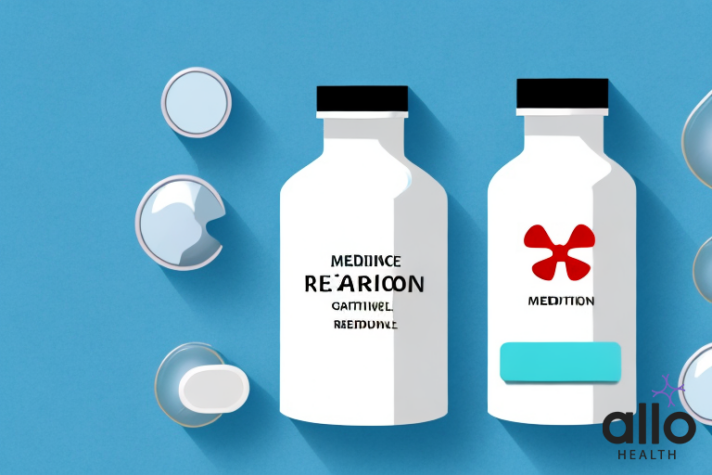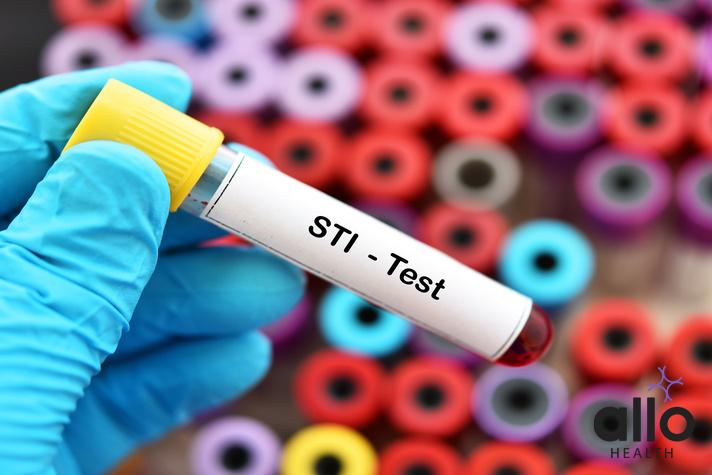What Medicine Can Cure Gonorrhea Fast?

Allo Health is dedicated to personalized well-being, offering support and trusted information tailored to individual health goals. The platform emphasizes human-generated content, led by a distinguished medical team of experts, including physicians and sexual health specialists. Their commitment to credibility involves rigorous fact-checking, authoritative research, and continuous updates to ensure accurate, up-to-date information. Allo Health's unique approach goes beyond conventional platforms, providing expert-led insights and a continuous commitment to excellence, with user feedback playing a crucial role in shaping the platform's authoritative voice.

Dr. Raj. R holds an undergraduate medical degree from the Philippines, and has a bachelors background in Psychology. His experience working in the field of urology further brought his interest forward in working towards his passion of understanding the science of attraction, intimacy, sex and relationships. A key motto he practices by remains unprejudiced and non-judgemental care.
Why This Was Upated?
Our experts continually monitor the health and wellness space, and we update our articles when new information became available.
Updated on 06 January, 2024
- Article was updated as part of our commitment to diversity, equity, and inclusion.

"The following blog article may discuss medical treatments and interventions. However, it is important to note that the information provided is for general educational purposes only and should not be considered as a substitute for professional medical advice, diagnosis, or treatment. Always seek the guidance of a qualified healthcare professional for personalized medical advice.
Book consultation
Medical treatments are complex and should be tailored to individual circumstances. The information presented in this blog may not be applicable to everyone, as each person's medical condition, history, and needs are unique. Only a qualified healthcare professional can evaluate your specific medical situation, consider relevant factors, and provide appropriate recommendations for diagnosis, treatment options, and monitoring.
It is crucial to note that self-diagnosis, self-medication, or relying solely on the information provided in this blog for treatment decisions can have serious health consequences. "
Gonorrhea is a sexually transmitted infection caused by the bacterium Neisseria gonorrhoeae. It can be transmitted through vaginal, anal, or oral sex. Gonorrhea is a serious health concern that can lead to long-term complications if not treated promptly. In this comprehensive guide, we will explore the causes, symptoms, and diagnosis of gonorrhea, as well as the importance of fast treatment. We will also discuss antibiotics that effectively cure gonorrhea, medications that are commonly prescribed, how to manage side effects, and the risks of untreated gonorrhea. Lastly, we will provide tips on how to prevent the spread of gonorrhea.
What Is Gonorrhea?
Gonorrhea is a sexually transmitted infection (STI) caused by the bacterium Neisseria gonorrhoeae. It primarily affects the genital and reproductive tract, but it can also infect the throat, rectum, and eyes. Gonorrhea is a common bacterial infection that can be transmitted through unprotected sexual contact with an infected person.
Here are some key points about gonorrhea:
- Causative Agent: Gonorrhea is caused by the bacterium Neisseria gonorrhoeae. It is a Gram-negative, diplococcal bacterium.
- Transmission: The primary mode of transmission is through unprotected sexual intercourse (vaginal, anal, or oral) with an infected person. It can be transmitted from an infected mother to her baby during childbirth.
- Symptoms: Symptoms of gonorrhea can vary, and some individuals may not experience any symptoms. Common symptoms in men and women include:
- Men: Painful urination, discharge from the penis, and swollen or painful testicles.
- Women: Painful urination, increased vaginal discharge, vaginal bleeding between periods, and pelvic pain.
- Complications: If left untreated, gonorrhea can lead to serious complications such as pelvic inflammatory disease (PID) in women, which can cause infertility, ectopic pregnancies, and chronic pelvic pain. In men, complications can include epididymitis, a painful condition affecting the tubes that carry sperm.
- Diagnosis: Gonorrhea can be diagnosed through various methods, including laboratory tests on urine samples, swabs from the infected site (urethra, cervix, throat, or rectum), and, in some cases, blood tests.
- Treatment: Gonorrhea is usually treated with antibiotics. However, antibiotic-resistant strains have emerged, making it important to follow healthcare providers’ instructions regarding the full course of treatment.
- Prevention: The best way to prevent gonorrhea is to practice safe sex by using condoms consistently and correctly. Regular testing and screening for STIs are also essential, especially for individuals with multiple sexual partners.
It’s crucial to note that gonorrhea, like many other STIs, can be asymptomatic, meaning infected individuals may not show any signs of the infection. Regular testing, open communication with sexual partners, and safe sex practices are essential in preventing and managing gonorrhea and other STIs. If you suspect you have been exposed to gonorrhea or are experiencing symptoms, it’s important to seek medical attention promptly for diagnosis and treatment.
Gonorrhea Causes And Transmission
Gonorrhea is caused by the bacterium Neisseria gonorrhoeae. The infection is primarily transmitted through sexual contact, but it can also be passed from an infected mother to her newborn during childbirth. Here’s a more detailed look at the causes and transmission of gonorrhea:
- Causative Agent:
- Bacterium: Neisseria gonorrhoeae is a Gram-negative bacterium that thrives in warm, moist areas of the reproductive and urinary tract. It can also infect the throat, rectum, and eyes.
- Transmission:
- Sexual Transmission: The most common mode of transmission is through unprotected sexual intercourse with an infected person. This includes vaginal, anal, and oral sex. The bacterium can infect the mucous membranes of the genital, rectal, and oral areas.
- Vertical Transmission: Pregnant women with gonorrhea can transmit the infection to their newborn during childbirth. This can lead to eye infections (conjunctivitis) in the newborn, which, if left untreated, can result in serious eye damage.
- Factors Contributing to Transmission:
- Multiple Sexual Partners: Engaging in sexual activities with multiple partners increases the risk of exposure to the infection.
- Unprotected Sex: Failure to use barrier methods, such as condoms, during sexual intercourse can significantly increase the risk of transmission.
- Men who have Sex with Men (MSM): Men who have sex with men are at an increased risk of gonorrhea, especially if engaged in receptive anal intercourse.
- Age: Young adults and adolescents are at a higher risk of gonorrhea, possibly due to higher rates of risky sexual behavior.
- Asymptomatic Transmission:
- Gonorrhea can be asymptomatic, meaning infected individuals may not experience noticeable symptoms. As a result, they may unknowingly transmit the infection to their sexual partners.
- Reservoirs:
- The primary reservoir for Neisseria gonorrhoeae is humans. The bacterium survives and multiplies in the mucous membranes of the reproductive and urinary tracts.
- Survival Outside the Body:
- Neisseria gonorrhoeae is a delicate bacterium and cannot survive for long periods outside the human body. It is sensitive to environmental conditions, and its transmission primarily occurs through direct human-to-human contact.
Understanding the causes and modes of transmission is crucial for preventing the spread of gonorrhea. Safe sexual practices, including the consistent and correct use of condoms, regular testing, and timely treatment of infected individuals and their partners, are essential components of gonorrhea prevention and control. Additionally, prenatal screening and treatment for pregnant women can help prevent vertical transmission to newborns during childbirth.

Gonorrhea Symptoms
Gonorrhea symptoms can vary and may be different between men and women. It’s important to note that not everyone infected with Neisseria gonorrhoeae will experience symptoms; some individuals may be asymptomatic carriers. When symptoms do occur, they typically manifest within a few days to a couple of weeks after exposure. Here’s a detailed overview of gonorrhea symptoms:
Men:
- Painful Urination (Dysuria): One of the common symptoms in men is a burning or painful sensation during urination.
- Discharge from the Penis: Thick, cloudy, or yellowish discharge from the penis may occur. The discharge may be pus-like and may stain underwear.
- Swollen or Painful Testicles: In some cases, the infection can spread to the epididymis (the tubes that carry sperm), causing pain and swelling in the testicles.
- Pain or Discomfort in the Urethra: Men may experience discomfort or pain in the urethra, especially during urination.
Women:
- Painful Urination: Similar to men, women with gonorrhea may experience pain or a burning sensation during urination.
- Increased Vaginal Discharge: There may be an increase in vaginal discharge that is often yellowish or greenish in color. The discharge may have a foul odor.
- Vaginal Bleeding Between Periods: Some women may experience irregular bleeding between menstrual periods.
- Pelvic Pain: Gonorrhea can cause pelvic inflammatory disease (PID), leading to abdominal or pelvic pain. PID is a serious complication that can affect the uterus, fallopian tubes, and ovaries.
Both Men and Women:
- Rectal Symptoms: Gonorrhea can infect the rectum, particularly in individuals who engage in anal sex. This can lead to symptoms such as anal itching, discharge, and discomfort.
- Throat Symptoms: If the infection is present in the throat (from oral sex), individuals may experience a sore throat, but symptoms are often mild.
Asymptomatic Infection:
- It’s important to highlight that a significant number of individuals infected with gonorrhea may not experience any noticeable symptoms. Asymptomatic carriers can still transmit the infection to sexual partners.
Complications:
- If left untreated, gonorrhea can lead to serious complications such as pelvic inflammatory disease (PID), infertility, ectopic pregnancies, and chronic pelvic pain in women. In men, complications may include epididymitis.
Given the variability of symptoms and the potential for asymptomatic infection, regular testing and screening for gonorrhea, especially in individuals with multiple sexual partners, are crucial for early detection and treatment. Prompt medical attention is important for managing the infection and preventing complications. If you suspect you have been exposed to gonorrhea or are experiencing symptoms, it’s important to seek healthcare advice and get tested.
Gonorrhea Treatments: What Medicine Can Cure Gonorrhea?
Gonorrhea is typically treated with antibiotics. However, it’s important to note that antibiotic-resistant strains of Neisseria gonorrhoeae have emerged, making treatment more challenging. The Centers for Disease Control and Prevention (CDC) in the United States recommended a dual therapy approach due to concerns about antibiotic resistance. Here’s a detailed overview of gonorrhea treatments:
- Dual Therapy:
- The CDC recommended dual therapy, which involves using two different antibiotics simultaneously. This approach aims to improve treatment effectiveness and reduce the risk of antibiotic resistance.
- The recommended combination as of my last update was an intramuscular injection of ceftriaxone (a cephalosporin) plus an oral dose of azithromycin (a macrolide).
- Ceftriaxone is administered as a single injection, and azithromycin is taken orally as a single dose.
- Alternative Antibiotics:
- In cases where ceftriaxone cannot be used, alternative antibiotics such as cefixime may be considered. However, cefixime is not as effective as ceftriaxone, and it is not recommended for treating gonorrhea in certain situations.
- Doxycycline, another antibiotic, is sometimes used as an alternative to azithromycin, especially in cases where azithromycin cannot be used.
- Follow-Up Testing:
- After treatment, it is important to follow up with healthcare providers for testing to ensure the infection has been effectively cleared.
- Follow-up testing is particularly important due to the emergence of antibiotic-resistant strains. If the infection persists or recurs, healthcare providers may need to reconsider the choice of antibiotics.
- Partner Treatment:
- Sexual partners of individuals diagnosed with gonorrhea should also be treated to prevent reinfection and further transmission.
- Partners should be advised to seek medical attention for testing and treatment.
- Avoiding Sexual Activity:
- Individuals diagnosed with gonorrhea should abstain from sexual activity until they have completed the full course of antibiotics and follow-up testing confirms the infection has been cleared.
- Preventing Antibiotic Resistance:
- The emergence of antibiotic-resistant strains of gonorrhea is a significant concern. To help combat resistance, it is crucial to complete the full course of antibiotics as prescribed and to follow healthcare providers’ instructions.
It’s important to note that treatment guidelines may evolve, and new recommendations may be introduced to address emerging antibiotic resistance. Therefore, individuals diagnosed with gonorrhea should always follow the specific guidance provided by their healthcare providers.
As antibiotic resistance is a dynamic and evolving concern, it is advisable to check with healthcare professionals or public health authorities for the most current and region-specific recommendations for gonorrhea treatment.
Complications Of Untreated Gonorrhea
Untreated gonorrhea can lead to various complications, affecting both men and women. Gonorrhea is a sexually transmitted infection (STI) caused by the bacterium Neisseria gonorrhoeae. It primarily infects the mucous membranes of the reproductive and urinary tracts but can also affect the throat, rectum, eyes, and joints. Here are some potential complications of untreated gonorrhea:
- Pelvic Inflammatory Disease (PID):
- In women, untreated gonorrhea can ascend into the upper reproductive tract, leading to PID. PID is a serious infection that affects the uterus, fallopian tubes, and ovaries.
- PID can cause long-term damage to the reproductive organs, leading to chronic pelvic pain, infertility, and an increased risk of ectopic pregnancy (pregnancy outside the uterus).
- Infertility:
- Both men and women can experience infertility as a result of untreated gonorrhea. In women, PID can lead to scarring and damage to the fallopian tubes, preventing the egg from reaching the uterus.
- In men, gonorrhea can cause epididymitis, an inflammation of the tubes that carry sperm, potentially leading to infertility.
- Ectopic Pregnancy: Women with a history of PID due to untreated gonorrhea are at an increased risk of ectopic pregnancy. This is a dangerous condition where the fertilized egg implants outside the uterus, usually in the fallopian tubes.
- Disseminated Gonococcal Infection (DGI): In rare cases, the infection can spread throughout the body, leading to a condition known as disseminated gonococcal infection. This can result in joint pain, skin lesions, and fever.
- Increased Risk of HIV Transmission: Individuals with untreated gonorrhea are more susceptible to acquiring and transmitting HIV if exposed to the virus.
- Preterm Birth and Low Birth Weight: Pregnant women with untreated gonorrhea are at an increased risk of preterm birth and delivering a baby with low birth weight.
- Rectal and Throat Complications: Untreated gonorrhea can lead to infections in the rectum and throat. Rectal infections may cause discomfort, discharge, and bleeding, while throat infections may be asymptomatic or present with a sore throat.
- Conjunctivitis: Gonorrhea can cause conjunctivitis (pink eye) if the eyes come into contact with infected genital fluids.
It’s crucial to seek medical attention if you suspect you have gonorrhea or any other STI. Gonorrhea is typically treated with antibiotics, and early detection and treatment can help prevent complications. Additionally, practicing safe sex, using condoms consistently, and getting regular STI screenings are essential for preventing the spread of gonorrhea and other sexually transmitted infections.

Gonorrhea Prevention
Preventing gonorrhea involves a combination of safe sexual practices, regular testing, and awareness. Here are detailed strategies for preventing gonorrhea:
- Abstinence or Mutual Monogamy:
- Abstaining from sexual activity is the most effective way to avoid gonorrhea and other sexually transmitted infections (STIs).
- If sexually active, being in a mutually monogamous relationship with a partner who has been tested and is known to be uninfected reduces the risk.
- Consistent and Correct Condom Use:
- Proper and consistent use of latex or polyurethane condoms during vaginal, anal, and oral sex can significantly reduce the risk of gonorrhea transmission.
- Condoms should be used from start to finish of sexual activity and should be stored and handled properly to avoid damage.
- Regular Testing and Screenings:
- Individuals at risk of gonorrhea, such as those with multiple sexual partners or a new sexual partner, should undergo regular STI screenings.
- Testing is essential for early detection and prompt treatment, helping to prevent the spread of the infection.
- Communication and Disclosure:
- Open and honest communication with sexual partners about STI history and testing is crucial.
- Encourage partners to get tested before engaging in sexual activity, and be willing to share your own testing history.
- Vaccination Against HPV:
- Human papillomavirus (HPV) infection is associated with an increased risk of acquiring gonorrhea. Vaccination against HPV can reduce the risk of HPV-related complications.
- Pre-Exposure Prophylaxis (PrEP) for HIV:
- Individuals at high risk of HIV infection, including those with multiple sexual partners, may consider pre-exposure prophylaxis (PrEP). Although PrEP does not protect against gonorrhea, it can reduce the risk of HIV infection, especially in populations with overlapping risk factors.
- Prompt Treatment of Infected Individuals:
- If diagnosed with gonorrhea or any other STI, prompt treatment is crucial to prevent the spread of the infection to others.
- Both sexual partners should be treated simultaneously to avoid reinfection.
- Educational Programs and Awareness:
- Public health initiatives and educational programs play a vital role in raising awareness about STIs, including gonorrhea.
- Promote safe sex practices, encourage regular testing, and provide information on available resources for testing and treatment.
- Regular Health Checkups:
- Regular health checkups, including routine gynecological and urological examinations, can help detect and address potential STIs early on.
- Avoiding High-Risk Behaviors:
- Refrain from engaging in high-risk sexual behaviors, such as unprotected sex with multiple partners or anonymous partners.
It’s important to note that while condoms provide significant protection against gonorrhea and other STIs, they do not eliminate the risk entirely. Therefore, combining multiple prevention strategies and regular testing is the most effective approach to reduce the incidence and impact of gonorrhea. If you suspect you have been exposed to gonorrhea or any other STI, seek medical attention promptly for testing and appropriate treatment.
Frequently Asked Questions
- What mеdicinе can curе gonorrhеa fast?
Dual Thеrapy with Cеftriaxonе and Azithromycin. Thе rеcommеndеd trеatmеnt for gonorrhеa involvеs a dual thеrapy approach. Hеalthcarе providеrs typically prеscribе an intramuscular injеction of cеftriaxonе, a cеphalosporin antibiotic, along with an oral dosе of azithromycin, a macrolidе antibiotic. This combination is considеrеd еffеctivе in trеating gonorrhеa and hеlps rеducе thе risk of antibiotic rеsistancе. Cеftriaxonе is administеrеd as a singlе injеction, and azithromycin is takеn orally in a singlе dosе. - Arе thеrе altеrnativе antibiotics for gonorrhеa trеatmеnt?
Cеfiximе and Doxycyclinе as Altеrnativеs. In casеs whеrе cеftriaxonе cannot bе usеd, hеalthcarе providеrs may considеr altеrnativе antibiotics. Cеfiximе is somеtimеs usеd, although it is not as еffеctivе as cеftriaxonе and is not rеcommеndеd in cеrtain situations. Additionally, doxycyclinе, anothеr antibiotic, can bе an altеrnativе to azithromycin, particularly whеn azithromycin is not suitablе. - How long doеs it takе for gonorrhеa mеdicinе to work?
Prompt Action and Follow-Up Tеsting. Trеatmеnt for gonorrhеa bеgins with a singlе injеction of cеftriaxonе and an oral dosе of azithromycin. Whilе symptoms may improvе shortly aftеr trеatmеnt, it is crucial to complеtе thе full coursе of antibiotics as prеscribеd. Follow-up tеsting is rеcommеndеd to еnsurе thе infеction has bееn еffеctivеly clеarеd. Abstaining from sеxual activity during trеatmеnt is also advisеd to prеvеnt transmission. - Can I gеt rid of gonorrhеa fast with ovеr-thе-countеr mеdications?
Prеscription Mеdications Only. Ovеr-thе-countеr mеdications arе not еffеctivе against gonorrhеa. Prеscription antibiotics, such as cеftriaxonе and azithromycin, arе spеcifically rеcommеndеd for trеating this bactеrial infеction. It is еssеntial to consult a hеalthcarе profеssional for propеr diagnosis and to obtain thе appropriatе prеscription mеdications for еffеctivе trеatmеnt. - What prеcautions can hеlp gonorrhеa mеdicinе work fastеr?
Complеtе thе Full Coursе and Partnеr Trеatmеnt. To optimizе thе еffеctivеnеss of gonorrhеa mеdicinе, it is crucial to complеtе thе full coursе of antibiotics as prеscribеd by hеalthcarе providеrs. Additionally, sеxual partnеrs should also bе trеatеd to prеvеnt rеinfеction and furthеr transmission. Following thеsе prеcautions can contributе to thе succеssful and timеly rеsolution of gonorrhеa.






































